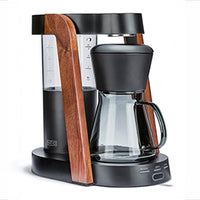Stop Storing Coffee Beans Like They’re Spices
Key Takeaways
-
Coffee beans are highly sensitive to light, oxygen, heat, and moisture
-
Storing beans in clear jars, open containers, or near heat sources destroys freshness
-
Ideal storage includes opaque, airtight containers in cool, dark environments
-
Avoid refrigerating or freezing beans unless long-term storage is needed
-
Freshness affects flavor clarity — poor storage results in flat, stale, or sour brews
Tossing your coffee beans into a glass jar on the kitchen counter might look nice, but it’s one of the quickest ways to kill their flavor. Unlike dried herbs or spices, coffee is not shelf-stable in the same way — and storing it like a seasoning blend almost guarantees disappointment in your cup.
Coffee is fresh produce. The way you store it determines how much of its aroma, flavor complexity, and balance ends up in your mug.
Let’s look at what you’re doing wrong — and how to do it better.
The Enemies of Freshness
Coffee’s worst enemies are:
-
Oxygen: Causes oxidation and staling
-
Light: Degrades oils and leads to rancid flavors
-
Moisture: Introduces mold risk and off-notes
-
Heat: Accelerates breakdown of volatile compounds
Unlike spices, which are often dried to near zero moisture and retain flavor through essential oils, coffee beans rely on delicate oils and sugars that degrade quickly with exposure.
If you store coffee like dried oregano, you’re stripping it of the very qualities that make it enjoyable.

Common Mistakes That Ruin Beans
1. Storing in Clear Glass Jars
Those see-through mason jars look great, but they expose beans to constant light.
Fix: Use opaque containers to protect from UV degradation.
2. Leaving Bags Open or Unsealed
Air sneaks in quickly and flattens flavor.
Fix: Reseal original bags tightly or transfer beans to airtight containers immediately.
3. Keeping Beans on the Countertop or Near Appliances
Heat from stoves or sunlight accelerates spoilage.
Fix: Store beans in a cool, dark pantry or cabinet away from heat sources.
4. Refrigerating Coffee
Fridges are humid and full of odors — coffee absorbs both.
Fix: Only freeze beans if absolutely necessary, and always in airtight, vacuum-sealed bags.
What Happens When Beans Go Stale
Stale beans don’t look that different — but the flavor tells the truth. You’ll notice:
-
Flat or cardboard-like taste
-
Sour, sourdough-like tang
-
No discernible flavor notes
-
Muddled, lifeless cup
Even top-shelf beans taste mediocre when mistreated. Proper storage keeps your coffee lively and expressive.
How Long Do Beans Stay Fresh?
-
Whole beans: 2–4 weeks after roast date (if stored properly)
-
Ground coffee: 1–2 weeks max
After that, the drop in quality is noticeable — especially in light or medium roasts. For peak performance, buy only what you’ll consume in two weeks.
Ideal Coffee Storage Setup
You don’t need a high-tech vault to protect your beans. Just follow these guidelines:
Best Practices:
-
Use airtight, opaque containers — think vacuum-sealed canisters or specialized coffee storage jars
-
Label roast dates and use older beans first
-
Store in a cool, dark place — not your countertop or windowsill
-
Avoid temperature swings (no fridge or freezer unless vacuum-sealed)
What to Look for in a Container:
-
One-way valve for degassing (if storing fresh-roasted)
-
Airtight silicone or rubber seal
-
Non-clear body to block light
How Storage Affects Brew Quality
When beans degrade, the brew suffers in multiple ways:
-
Loss of clarity: Flavor notes disappear
-
Excess bitterness: Old oils oxidize and taste harsh
-
Inconsistent extraction: Stale beans grind unevenly
It’s not just about freshness — it’s about repeatable, enjoyable coffee. Your grinder and brew method won’t matter if the beans are already past their prime.
Don’t Undo a Perfect Brew With Bad Storage
Great brewing starts before the water hits the grounds. It starts with how you treat your beans.
Even if you use a top-notch coffee machine like those from Ratio Coffee, storing old or poorly protected beans will undercut everything that machine does right. Protect your investment — and your taste buds — by keeping beans fresh from day one.
Frequently Asked Questions
Can I keep coffee beans in the fridge?
It’s not recommended. Fridges are humid and full of odors that coffee can absorb. Only freeze in vacuum-sealed bags if you need long-term storage.
How can I tell if my beans are stale?
If your coffee tastes flat, sour, or lacks aroma, your beans are likely past their prime.
Is it okay to store coffee in the bag it came in?
If the bag has a one-way valve and reseals tightly, yes. Otherwise, transfer to an airtight container.
Do darker roasts go stale faster?
Not necessarily, but their oilier surface can become rancid quicker when exposed to air and light.
What’s the best way to keep beans fresh?
Store in a cool, dark place using an airtight, opaque container. Buy in small quantities and avoid frequent opening and resealing.
 Ratio Eight S2
Ratio Eight S2
 Ratio Eight Original
Ratio Eight Original
 Ratio Six
Ratio Six
 Ratio Four
Ratio Four
 Compare Machines
Compare Machines






